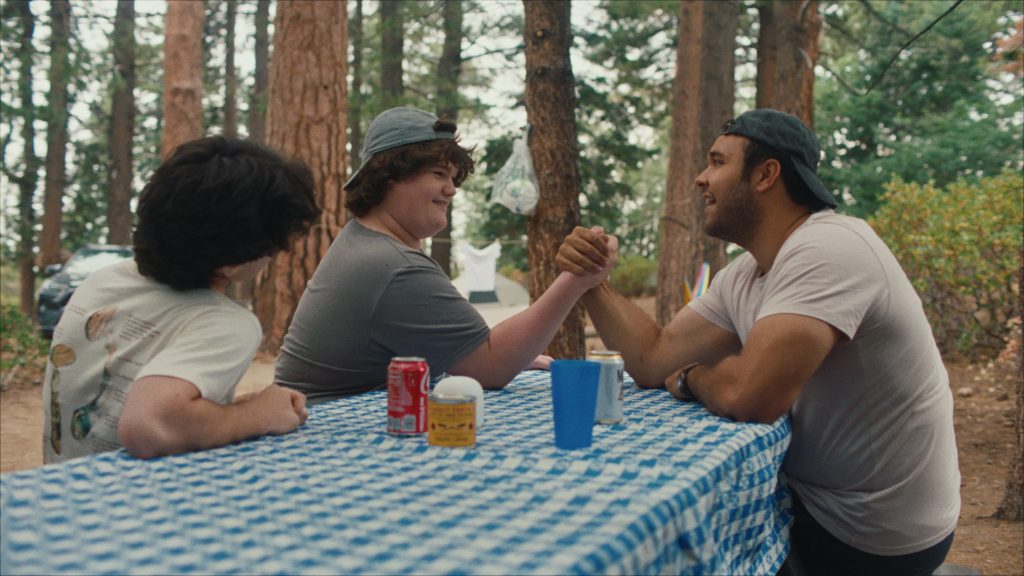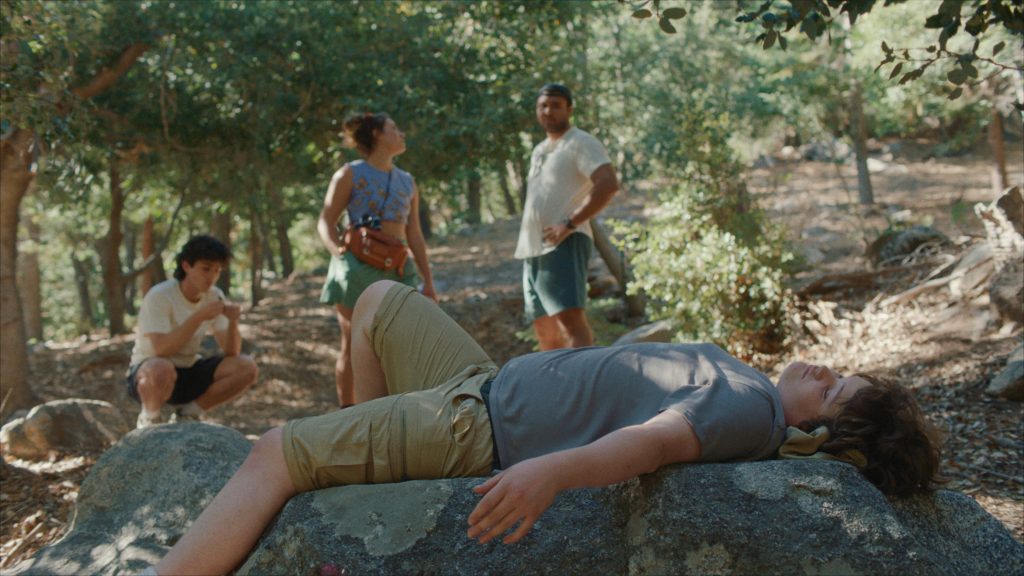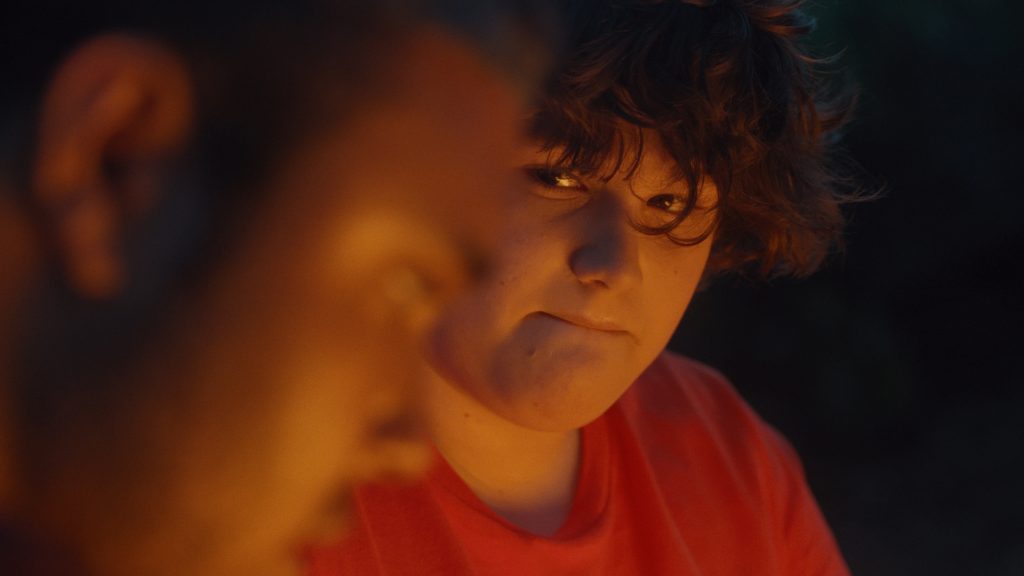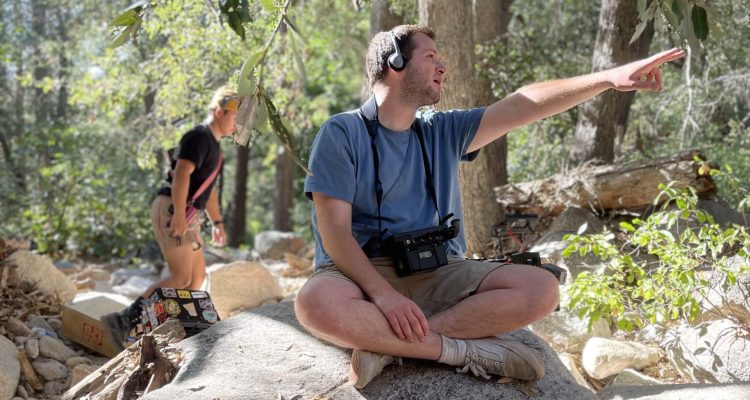With his stunning debut feature, writer-director Corey Sherman cements himself as a director to watch with his heartwarming film “Big Boys”, which has its West Coast premiere at Outfest Los Angeles.
The coming-of-age comedy was featured at London’s BFI Flare Festival, and Sherman won an honorable mention for Outstanding First Feature at the Frameline San Francisco LGBTQ Film Festival. It’s an achingly sweet crowd-pleaser with an incredibly mature breakthrough performance by lead actor Isaac Krasner.
In “Big Boys”, 14-year-old Jamie’s (Isaac Krasner) dream camping trip with his brother Will (Taj Cross) and cousin Allie (Dora Madison) is ruined when Allie brings her new burly boyfriend, Dan (David Johnson III), along for the weekend getaway. Jamie’s initial trepidation soon subsides as he bonds with Dan, who exudes confidence and a comfortable, masculine presence. But as the weekend progresses, Jamie’s burgeoning crush gets him into awkward exchanges as he comes to terms with his desires.
Sherman expertly navigates Jamie’s infatuation with a naturalistic style that feels immersive in its campground setting and cringe-worthy in Jamie’s raw vulnerability. Drawing on personal experiences, Sherman captures moments of relatable adolescent emotion as Jamie tries to picture himself past the years of self-discovery and into adulthood.
“I felt similar to Jamie at that age as somebody eager to make a good impression,” shares Sherman. “But at that age, you’re still developing your social skills, and you’re lacking some degree of self-awareness, so it can come out in these very funny and clumsy ways, particularly when there’s a contrast between how you’re appearing and how sophisticated an adult Jamie wants to be.”
Ahead of its premiere, Sherman spoke with Awards Focus about capturing Dan’s masculinity, transposing his short film background to a feature-length production, the challenges of filming in a campground and finding humor in the cringeworthy.

Awards Focus: I absolutely adored your film, and as a former chubby, closeted kid who loved camping, it was a very surreal experience watching Big Boys. What’s been the most surprising reaction to the film?
Corey Sherman: Well, the one you just said is definitely up there for me. People talk about how they see themselves in the main character and in ways they feel they haven’t seen in a movie. That was such a large impetus to make this. I felt like there were so many details of that moment in life I hadn’t seen and, I guess, represented with the kind of nuance, humor, and compassion that I wanted to see in a movie. When people talk to me and they tell me that they see themselves in this story, whether it’s in Jamie or another character, it’s the most rewarding thing.
AF: The characters are so well defined, like Jamie’s older brother Will, who is insecure and mimicries masculinity, and Dan, who’s very laid-back and cool and confident. What was your process for delving into these characters and defining their journeys as they relate to Jamie’s experience in the world?
Sherman: Thank you for bringing that up because I think that the movie is centered around Jamie’s confusion with his sexuality, but also his relationship to his masculinity and experiencing gender policing from the outside world. And so then policing himself, which anybody can relate to regardless of sexual orientation. Everyone feels pressured to put on a show and perform their gender in the way they think is right.
What you said about Will is totally accurate, where his masculinity is all very much borrowed from the world around him and probably his peer group. He more successfully sells a performance that is a lot more palatable to many people, giving him a sense of power and confidence. Dan is in a different place where he doesn’t need to put on as much of a show. He’s still very much a part of a culture of this cool guy and confident masculinity, but it’s a lot more accessible to Jamie because it has a softer and kinder side.
For Jamie, he doesn’t know where he fits in because he doesn’t really feel like either of them. It’s confusing, and I remember feeling really vividly unsettled. By the movie’s end, I wanted Jamie to have grown enough and taken enough risks and to see behind the masks and performances of those around him, where he ends up being not as intimated or threatened and confused by these other versions of masculinity. He’s more comfortable with the one he’s found.
AF: He might not know football players, but he can make a damn good burger.
Sherman: Totally! Just taking pride in what he’s good at.

AF: You wear many hats in this film as a writer, director, producer, and co-editor. How did your background in short filmmaking translate into a larger-scale feature-length film?
Sherman: I’ve been doing those jobs on shorts for a long time, and really since middle school. Growing up, I mostly made comedy short films, and I’ve always loved comedy. That experience taught me how to keep something tight and moving fast. A large part of going into this movie was that I wanted to make a film that was fun and easy, and accessible.
The biggest challenge, and ultimately one of the more rewarding parts of the process, was that I couldn’t rely on many of the same tricks and structures you use in a sketch. It became more about keeping people engaged in the story. How do we keep them in Jamie’s head? How do we keep them wondering what’s going to happen next? Luckily I was working with really great collaborators who had their own thoughts on how to express Jamie’s internal life in the most interesting way and to keep us hooked in the journey without overindulging.
AF: I loved the atmosphere of the campsite. The frequent inserts around the area, the sounds of the tent walls flapping, and the motions of the tent zippers opening and closing gave the film a natural atmosphere evocative of that environment. What was it like to film there, particularly with the constant changing direction of the light?
Sherman: I’m glad it was evocative for you in that way because our biggest goal was creating a rich world even though it’s contained and filling it with as many details that hopefully remind people of things from their childhood. Filming out there definitely had its challenges. We got hit with some rain and some thunderstorms at the most inopportune times. Sometimes there were tons of planes overhead or really gnarly bugs attacking the actors, but everyone was good sports.
It also helped that we were all living together for several weeks while we were shooting the film. It created a familial Summer Camp atmosphere where people felt genuinely close and had each other’s backs. The difficulty of things like the thunderstorm at 12:30 AM truly bonded us.
AF: Were you all camping together, or were you in hotels?
Sherman: No, no, I think that was a step too far. We were all staying in a cluster of Airbnb’s nearby.
AF: Were there many iterations of Dan before landing on someone as collected and warm? I could see how that role might’ve skewed into someone more uncomfortable for Jamie to be around.
Sherman: It’s funny you call that out, actually, because I remember working with David Johnson III on that. We would get some takes where he was colder and more opaque. I remembered that being a big thing when I was Jamie’s age of somebody not giving me much attention being the most attractive thing because there was so much to get from them. It was almost like an objective to get this person to like me. At the beginning of the movie, Dan is more mysterious to Jamie, and I think that reserved quality really worked. Then later, he opens up, and Jamie realizes he’s more accessible than he thought. It also helps that David is so good at conveying such a natural sense of warmth that he never felt too much or that he was leading the audience on.

AF: I read that Isaac Krasner was 16 at the time of filming. His performance is so superb. Was it difficult to be able to have him at certain times, given the restrictions around working with minors?
Sherman: I appreciate you keeping an eye out for these more logistical things because that was a big part of all this. We shot during the Summer, which was on purpose just so that he didn’t have to work with a studio teacher during that time because that would’ve gone into our shooting hours with him. He was allowed to work a certain number of hours in a day, which shaped our schedule, particularly because he couldn’t film past 12:30 AM, and we had a decent amount of night scenes.
We worked with great assistant directors who put together a schedule that worked for the movie, particularly with the shifting parts that were out of our control, like weather and location availability.
Also, this was Isaac’s first lead role and first feature film. He was just incredibly tapped in the whole time. I was amazed when things were physically strenuous because we were out there on hot days hiking up to different locations. Sometimes it would be upwards of six takes for a set-up. There was never a sense of artifice or what was happening in the outside world bleeding into his performance. He had such a deep and nuanced understanding of Jamie’s emotional life.
AF: There are quite a few cringe-worthy, awkward moments that Jamie initiates, and it felt at times he was improvising because his performance was so naturalistic.
Sherman: A lot of that was Isaac’s innate understanding of how somebody would express that kind of awkwardness. He was so good at playing a very realistic, people-pleaser that I certainly felt at that age. I still feel like that as somebody eager to make a good impression. But at that age, you’re still developing your social skills, and you’re lacking some degree of self-awareness, so it can come out in these very funny and clumsy ways, particularly when there’s a contrast between how you’re appearing and clearly how sophisticated an adult Jamie wants to be. Isaac, who carries himself with a lot of confidence and maturity, has a very deep understanding of his own vulnerabilities and is very brave at expressing them on screen.
I need to credit my co-editor Erik Vogt-Nilsen because a lot of this was in the editing. There were beats that sometimes we would find where it felt too long, and we’re milking it too much. He was particularly good at knowing when we push it and when we keep things moving. Figuring out that comedic rhythm with the silences is one of my favorite parts of filmmaking.
Link to Outfest Los Angeles Screening of “Big Boys”: https://outfest2023.eventive.org/schedule/big-boys-64902be9d1c03a004e4e6332


